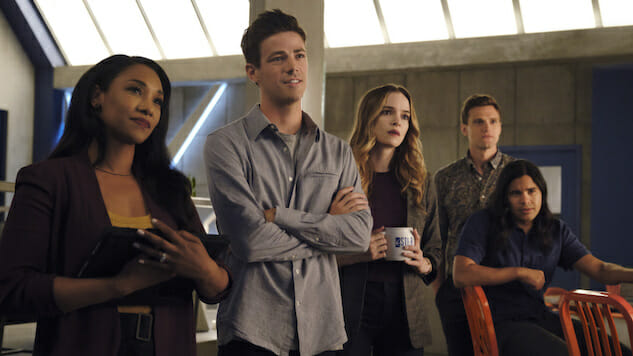How The Flash Has Found Its Heart Again in Season 6
Photo Courtesy of The CW
The Flash has long been the designated bright spot of The CW’s Arrowverse, a more light-hearted take on the superhero genre that wasn’t afraid to laugh and bring a little sunshine into the often-grim world of small screen comic book adaptations. It embraced the idea that being a superhero could actually be fun, and centered its story not only on Barry Allen, but the likeable group of partners and friends who have helped him along the way.
However, in recent seasons, The Flash has often been as dark and dour as any episode of Arrow. There was little joy to be found in Central City as the core relationships at the center of the show frayed under the weight of disconnected stories. The series couldn’t manage to make its villains feel relevant, or even particularly interesting. It failed to tell coherent stories. Things even got downright boring at times.
The Flash also didn’t consistently utilize its many cast members regularly, let alone bother to give them genuine arcs over the course of a full season. From Ralph’s initial messy introduction to the constantly shifting explanations for Caitlin’s icy alter ego Killer Frost to the confusing justification of future Nora’s ongoing presence in Barry’s present, almost everything was generally driven by plot necessity. Thing A happened, simple because Thing B needed to happen the following week, not because it was a decision or desire that came naturally to a particular character.
Thankfully, Season 6 seems determined to tackle these issues head on. And while we don’t know how this will all play out yet, it finally feels as though The Flash remembers what sort of show it originally set out to be, narratively speaking. This isn’t just a series about a guy who can run really fast and the monsters and villains he battles along the way. It’s about a found family of heroes, who—whether they have powers or not—want to make the world a better place. In its latest season, The Flash has rediscovered that the characters at its center are reason we all love the show in the first place and, as a result, it’s as narratively and creatively strong as it’s ever been.
True, there is an awful lot of plot happening in Season 6’s first episodes, as the series sets itself up for the upcoming “Crisis on Infinite Earths” crossover, new villain Bloodwork rises, and distinct plots for Killer Frost, Iris, Ralph and Cecile all kick into gear. Yet, despite the array of stories taking place onscreen, each still feels strictly character-driven. (This was, trust me, not always the case in recent years.) Furthermore, none exist in a narrative vacuum. The A, B, and C plots now intertwine to form something that feels like a cohesive whole, with each commenting on and impacting one another in interesting and unexpected ways.
Season 6’s first episodes largely revolve around Barry’s discovery that he must allow himself to die in just a few short weeks in order to save billions of lives. Pretty much every other story connects to this plot in some way, as Barry and Iris first process the news, and then break it to the rest of their teammates. Even the rise of Season 6’s first big villain ties into this “Crisis” reveal, with Ramsey Rosso serving as a dark mirror of sorts to Barry’s current struggle. He too is facing certain death, and The Flash’s decision to allow the two men to find something like connection and common ground before splitting them off on markedly different paths makes Ramsey’s slide into darkness feel like something that should legitimately matter to both Barry and the rest of Team Flash.
-

-

-

-

-

-

-

-

-

-

-

-

-

-

-

-

-

-

-

-

-

-

-

-

-

-

-

-

-

-

-

-

-

-

-

-

-

-

-

-








































